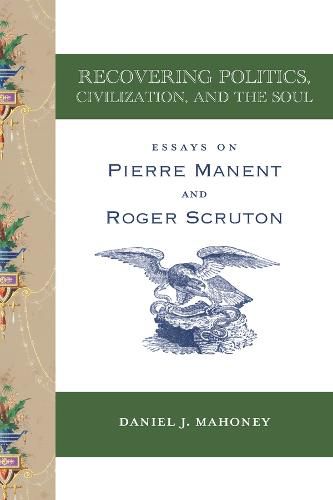Readings Newsletter
Become a Readings Member to make your shopping experience even easier.
Sign in or sign up for free!
You’re not far away from qualifying for FREE standard shipping within Australia
You’ve qualified for FREE standard shipping within Australia
The cart is loading…






The Western inheritance is under sustained theoretical and practical assault. Legitimate self-criticism has given way to nihilistic self-loathing and cultural, moral, and political repudiation is the order of the day. Yet, as Daniel J. Mahoney shows in this learned, eloquent, and provocative set of essays, two contemporary philosophic thinkers, Roger Scruton and Pierre Manent, have–separately and together–traced a path for the renewal of politics and practical reason, our civilized inheritance, the natural moral law, and the soul as the enduring site of self-conscious reflection, moral and civic agency, and mutual accountability.
Both Scruton and Manent have repudiated the fashionable nihilism associated with the thought of 1968 and the Parisian nonsense machine, and have shown that gratitude is the proper response of the human person to the givenness of things. Both defend the self-governing nation against reckless nationalism and the even more reckless temptation of supranational governance and post-political democracy, what Manent suggestively calls a kratos without a demos. Both defend the secular state while taking aim at a radical secularism that rejects the Christian mark that is at the heart of our inheritance and that sustains the rich and necessary interpenetration of truth and liberty. Scruton’s more cultural perspective is indebted to Burke and Kant; Manent’s more political perspective draws on Aristotle, St. Thomas, Tocqueville, and Raymond Aron, among others. By highlighting their affinities, and reflecting on their instructive differences, Mahoney shows how, together, the English man of letters Scruton, and the French political philosopher Manent, guide us to the recovery of a horizon of thought and action animated by practical reason and the wellsprings of the human soul. They show us the humanizing path forward, but first we must make the necessary spiritual decision to repudiate repudiation once and for all.
$9.00 standard shipping within Australia
FREE standard shipping within Australia for orders over $100.00
Express & International shipping calculated at checkout
The Western inheritance is under sustained theoretical and practical assault. Legitimate self-criticism has given way to nihilistic self-loathing and cultural, moral, and political repudiation is the order of the day. Yet, as Daniel J. Mahoney shows in this learned, eloquent, and provocative set of essays, two contemporary philosophic thinkers, Roger Scruton and Pierre Manent, have–separately and together–traced a path for the renewal of politics and practical reason, our civilized inheritance, the natural moral law, and the soul as the enduring site of self-conscious reflection, moral and civic agency, and mutual accountability.
Both Scruton and Manent have repudiated the fashionable nihilism associated with the thought of 1968 and the Parisian nonsense machine, and have shown that gratitude is the proper response of the human person to the givenness of things. Both defend the self-governing nation against reckless nationalism and the even more reckless temptation of supranational governance and post-political democracy, what Manent suggestively calls a kratos without a demos. Both defend the secular state while taking aim at a radical secularism that rejects the Christian mark that is at the heart of our inheritance and that sustains the rich and necessary interpenetration of truth and liberty. Scruton’s more cultural perspective is indebted to Burke and Kant; Manent’s more political perspective draws on Aristotle, St. Thomas, Tocqueville, and Raymond Aron, among others. By highlighting their affinities, and reflecting on their instructive differences, Mahoney shows how, together, the English man of letters Scruton, and the French political philosopher Manent, guide us to the recovery of a horizon of thought and action animated by practical reason and the wellsprings of the human soul. They show us the humanizing path forward, but first we must make the necessary spiritual decision to repudiate repudiation once and for all.